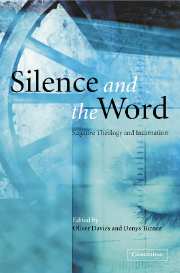Book contents
- Frontmatter
- Contents
- Notes on contributors
- Preface
- Introduction
- 1 Apophaticism, idolatry and the claims of reason
- 2 The quest for a place which is ‘not-a-place’: the hiddenness of God and the presence of God
- 3 The gift of the Name: Moses and the burning bush
- 4 Aquinas on the Trinity
- 5 Vere tu es Deus absconditus: the hidden God in Luther and some mystics
- 6 The deflections of desire: negative theology in trinitarian disclosure
- 7 The formation of mind: Trinity and understanding in Newman
- 8 ‘In the daylight forever?’: language and silence
- 9 Apophasis and the Shoah: where was Jesus Christ at Auschwitz?
- 10 Soundings: towards a theological poetics of silence
- Select bibliography
- Index
8 - ‘In the daylight forever?’: language and silence
Published online by Cambridge University Press: 22 September 2009
- Frontmatter
- Contents
- Notes on contributors
- Preface
- Introduction
- 1 Apophaticism, idolatry and the claims of reason
- 2 The quest for a place which is ‘not-a-place’: the hiddenness of God and the presence of God
- 3 The gift of the Name: Moses and the burning bush
- 4 Aquinas on the Trinity
- 5 Vere tu es Deus absconditus: the hidden God in Luther and some mystics
- 6 The deflections of desire: negative theology in trinitarian disclosure
- 7 The formation of mind: Trinity and understanding in Newman
- 8 ‘In the daylight forever?’: language and silence
- 9 Apophasis and the Shoah: where was Jesus Christ at Auschwitz?
- 10 Soundings: towards a theological poetics of silence
- Select bibliography
- Index
Summary
The title of this chapter deliberately echoes the title of an early volume by George Steiner, also called Language and Silence. There is no essay in the volume with that title, but there are several essays devoted to various forms of association between language and silence; essays which witness to the varieties of silence. In ‘Retreat from the Word’, for example, Steiner treats the crisis in literacy in the middle years of the twentieth century. It is a crisis in which language and reality have become divorced, where, in a world in which mathematics map the profundities of what is real, the world of words has shrunk. In the ‘retreat from the authority and range of verbal language’ we are heading towards a tawdry banality, a silence into which civilisation will slide and perish. In ‘Night Words’ he treats this increasing banality with respect to the ‘new pornographers’ who parade the vital privacies of sexual experience, taking away the words that were spoken in the night to shout them from midmorning rooftops. In the commercialisation of sex, Steiner observes, lies the kenosis of the Word (capital letter), the impoverishment of Logos itself. And in a selection of six essays, organised under the heading ‘Language out of Darkness’, Steiner treats what is evidently, as for Adorno, the root of the traumatising autism: the death-camps and the ethnic cleansing of Nazi Germany. The silence grows palpable: ‘The language will no longer grow and freshen.
- Type
- Chapter
- Information
- Silence and the WordNegative Theology and Incarnation, pp. 159 - 184Publisher: Cambridge University PressPrint publication year: 2002
- 4
- Cited by

